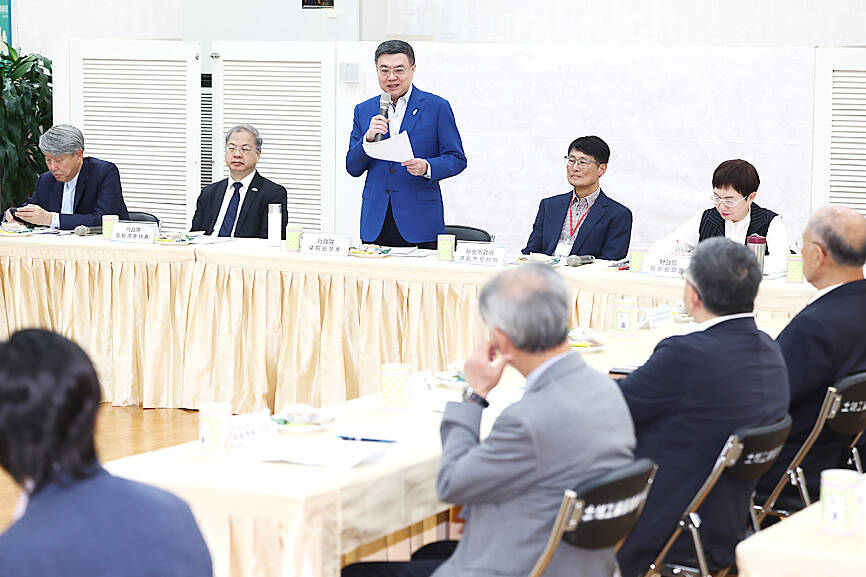The Executive Yuan yesterday announced further details of its NT$88 billion (US$2.71 billion) relief package for businesses affected by US tariffs, including application procedures and eligibility criteria, as the government aims to provide firms with greater financial flexibility amid global economic uncertainty.
The government has also eased requirements for relief applications to ensure more businesses remain operational amid US tariff threats, the Executive Yuan said in a statement.
The eligibility criteria for export loan guarantees and loans for small and medium-sized enterprises (SMEs) have also been relaxed, it said.

Photo: CNA
For example, companies that report a decline in revenue of at least 10 percent during a designated period this year compared with the same period last year, the second half of last year on a monthly basis or the January-to-February period, would qualify for government relief loans, it said.
The previous requirements limited eligibility to firms with a single-month revenue drop of at least 15 percent and fewer than 30 employees.
Exporters would benefit from loans with reduced interest rates under the relief program, which is expected to assist up to 24,000 businesses, Executive Yuan Secretary-General Kung Ming-hsin (龔明鑫) said in a statement.
Loan terms for companies most affected by the new US tariffs would be extended, and the application process for new loans would be simplified, he said.
For agricultural financing, the program is projected to support up to 15,600 households, he added.
Meanwhile, the Ministry of Economic Affairs (MOEA) is allocating a total budget of NT$41 billion to support exporters and SMEs affected by US tariffs, the ministry said in a separate statement yesterday.
The funding would cover industrial transformation, research and development subsidies and assistance in securing overseas orders, the ministry said.
The ministry also plans to provide up to NT$6 billion in loan guarantees to support importers and exporters affected by US tariffs.
Each SME could receive up to NT$60 million in guarantees — with fees waived or reduced for up to two years — while large firms may qualify for up to NT$100 million, it said.
As part of the broader relief initiative, the Small and Medium Enterprise Credit Guarantee Fund (中小企業信用保證基金) plans to offer a new loan guarantee program offering loans of up to NT$35 million for SMEs once the current programs expire in October, fund chairman Wei Ming-ku (魏明谷) told the Taipei Times.
The fund has provided up to NT$800 billion in loan guarantees to local small, medium and micro-sized enterprises since May 2023, Wei said.

Sweeping policy changes under US Secretary of Health and Human Services Robert F. Kennedy Jr are having a chilling effect on vaccine makers as anti-vaccine rhetoric has turned into concrete changes in inoculation schedules and recommendations, investors and executives said. The administration of US President Donald Trump has in the past year upended vaccine recommendations, with the country last month ending its longstanding guidance that all children receive inoculations against flu, hepatitis A and other diseases. The unprecedented changes have led to diminished vaccine usage, hurt the investment case for some biotechs, and created a drag that would likely dent revenues and

Global semiconductor stocks advanced yesterday, as comments by Nvidia Corp chief executive officer Jensen Huang (黃仁勳) at Davos, Switzerland, helped reinforce investor enthusiasm for artificial intelligence (AI). Samsung Electronics Co gained as much as 5 percent to an all-time high, helping drive South Korea’s benchmark KOSPI above 5,000 for the first time. That came after the Philadelphia Semiconductor Index rose more than 3 percent to a fresh record on Wednesday, with a boost from Nvidia. The gains came amid broad risk-on trade after US President Donald Trump withdrew his threat of tariffs on some European nations over backing for Greenland. Huang further

CULPRITS: Factors that affected the slip included falling global crude oil prices, wait-and-see consumer attitudes due to US tariffs and a different Lunar New Year holiday schedule Taiwan’s retail sales ended a nine-year growth streak last year, slipping 0.2 percent from a year earlier as uncertainty over US tariff policies affected demand for durable goods, data released on Friday by the Ministry of Economic Affairs showed. Last year’s retail sales totaled NT$4.84 trillion (US$153.27 billion), down about NT$9.5 billion, or 0.2 percent, from 2024. Despite the decline, the figure was still the second-highest annual sales total on record. Ministry statistics department deputy head Chen Yu-fang (陳玉芳) said sales of cars, motorcycles and related products, which accounted for 17.4 percent of total retail rales last year, fell NT$68.1 billion, or

Macronix International Co (旺宏), the world’s biggest NOR flash memory supplier, yesterday said it would spend NT$22 billion (US$699.1 million) on capacity expansion this year to increase its production of mid-to-low-density memory chips as the world’s major memorychip suppliers are phasing out the market. The company said its planned capital expenditures are about 11 times higher than the NT$1.8 billion it spent on new facilities and equipment last year. A majority of this year’s outlay would be allocated to step up capacity of multi-level cell (MLC) NAND flash memory chips, which are used in embedded multimedia cards (eMMC), a managed